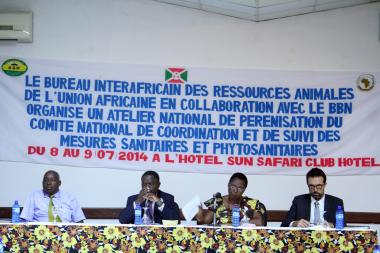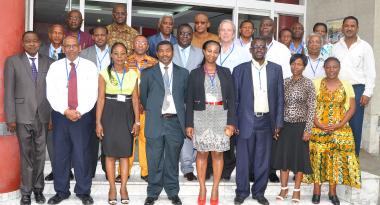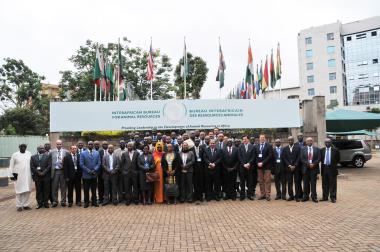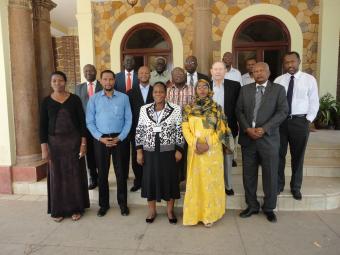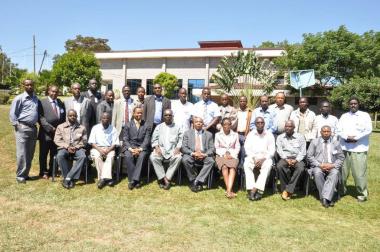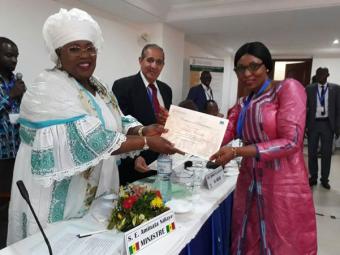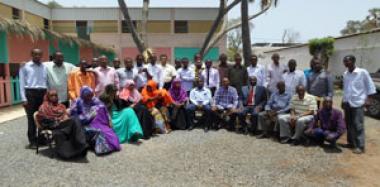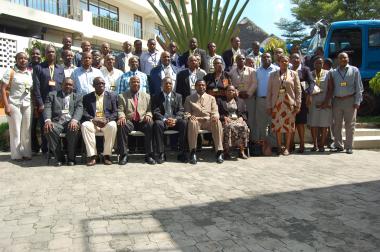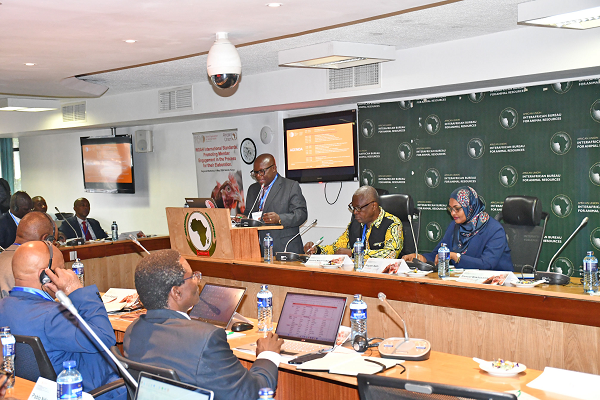
An orientation workshop on the WOAH International Standards took place on 14 May 2024 with the objective of enhancing African Union Member State countries in the participation in the development and refinement of crucial international standards for the livestock sector in the region. The workshop took place at the AU-IBAR premises and was facilitated by WOAH. It was well-attended by Chief Veterinary Officers (CVOs) from various countries across the continent. The workshop emphasised the successful partnership between WOAH and AU-IBAR, which has played a crucial role in advancing the acceptance and execution of global standards in Africa.
The event received a positive reception from Samuel Wahusama, Sub-Regional Representative for Eastern Africa, WOAH, and Dr. Huyam Salih, Director, AU-IBAR. Dr. Salih emphasised the importance of standards in livestock disease management for the African Continental Free Trade Area (AfCFTA). She highlighted the importance of African Union Member States (AU MS) working together effectively to ensure that Africa's perspective is well-represented on the global stage. This partnership would empower African experts to actively contribute to the development of standards tailored to the continent, guaranteeing that WOAH standards accurately address Africa's distinct requirements.
The meeting's agenda featured a series of informative sessions aimed at providing a thorough understanding of the WOAH International Standards and the process behind their development. Here is a breakdown of the sessions:
An Introduction and Overview of WOAH International Standards
Exploring the Standard Setting Process Getting Involved in the Standard Setting Process
Introducing WOAH International Standards: A Comprehensive Overview
The workshop commenced with a comprehensive introduction and overview of WOAH International Standards. Attendees were informed about the significance of these standards in safeguarding the well-being and security of livestock worldwide. The session emphasised the process of developing these standards and their significant impact on international trade, disease control, and animal well-being.
The Standard Setting Process: A Comprehensive Overview
The following session centred around the standard-setting process for WOAH. The article provides a comprehensive overview of the various stages involved in the development of standards, starting from the initial proposal phase all the way through to the final adoption process. The process requires thorough consultation and collaboration among member countries, experts, and stakeholders. Our objective is to guarantee that the standards are grounded in scientific research, are applicable in real-world situations, and have gained widespread recognition.
Participating in the Standard Setting Process
The last session highlighted the significance of member engagement in the process of setting standards. Attendees were educated on the different methods they could use to make a valuable contribution, such as submitting proposals, joining working groups, and providing feedback on draft standards. This engagement is of utmost importance in order to ensure that the standards are tailored to the needs of all members, especially those from Africa.
The Significance of WOAH Standards
The meeting highlighted the significance of WOAH standards in various crucial areas:
Effective standards play a crucial role in managing and preventing the spread of livestock diseases, ensuring the smooth operation of both local and international trade.
Facilitating Trade: Standardising regulations simplifies the process of trading livestock and livestock products between countries, fostering economic development and ensuring food security.
Animal Welfare: Ensuring the humane treatment of livestock is of utmost importance, as it reflects the growing global concern for the well-being of animals.
For over 15 years, the African Union has been leading the way in coordinating unified positions to be presented at the WOAH General Assembly. This important work is carried out by the Inter-African Bureau for Animal Resources (IBAR). This collaborative effort seeks to impact the establishment of standards that take into account the urgent requirements of the continent and their practical implementation in real-world scenarios. The implementation of such strategies aims to enhance the quality of life, stimulate economic growth, and ensure food security and nutrition. This is achieved by facilitating the entry of African animal products into global markets, while also promoting the sustainable development of the livestock industry. The goal is to create a more streamlined, inclusive, and resilient sector.
WOAH and AU-IBAR have a strong and collaborative partnership, dedicated to strengthening the ability of African nations to actively participate in the process of setting standards. This workshop marked significant progress in enhancing the inclusivity and relevance of WOAH standards for all member countries, with a particular focus on those in Africa.
Through promoting active engagement and cooperation, WOAH and AU-IBAR are striving for a future where sustainable livestock production, disease management, and trade are bolstered by international standards throughout the African continent. This initiative is crucial for the success of the AfCFTA and the overall growth of the livestock sector in Africa.
The regional workshop precedes the 16th Pan African Chief Veterinary Officers/WOAH Delegates Meeting scheduled to be held at AU-IBAR from 15-16 May 2024. The purpose of this gathering is to address and resolve the primary animal health issues that are hindering advancements in preventing and controlling priority transboundary and zoonotic diseases. The article will also discuss the key requirements for enhancing animal health systems, promoting the prevention and control of important pests and diseases, achieving industry standards, expanding market access, and ensuring public health safety.

